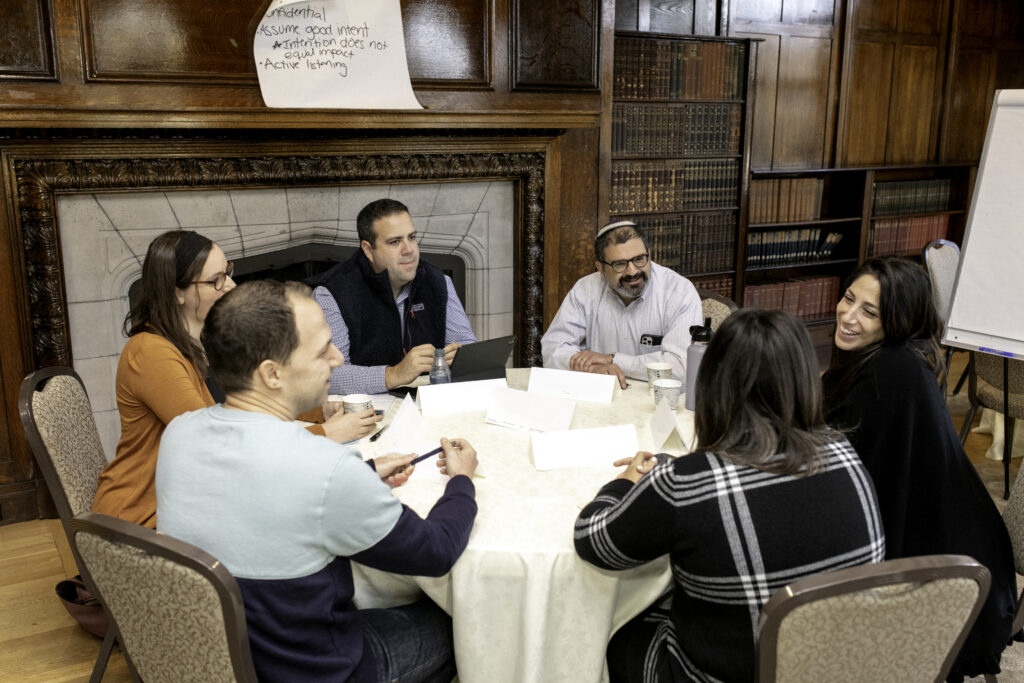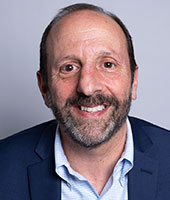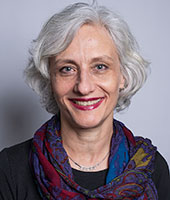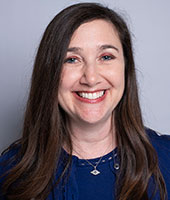
Eva Heinstein
In November, we convened Cohort II of the Executive Leadership Program for a seminar in Dover, MA focused on the Israel-Diaspora relationship. It marked the first time in nearly two years that we were able to meet in person, which set the stage for an especially energizing gathering.
A feature of each seminar is an experiential learning project that enables fellows to integrate faculty teaching with their own professional practice. For this convening, we developed a multi-party simulation focused on future events that could unfold in Israel and North America and the pressures that Jewish communal leaders face in an increasingly polarized environment. We hoped that a play-based approach would enable fellows to empathetically hold diverse perspectives on Israel, explore challenging scenarios and perhaps even discover new lines of action for their organizations.
Fellows prepared for the exercise by reading a detailed scenario, which describes a local Israel dialogue initiative guided by representatives of organizations spanning the political spectrum, including a Jewish community relations council, StandWithUs, the Israeli-American Council (IAC), Moishe House and IfNotNow. Action unfolds as members of the diverse steering committee are faced with an escalating political crisis in Israel. Fellows, playing the roles of representatives of the disparate organizations, must navigate rapidly unfolding international and local developments while seeking to advance their organizations’ particular values and commitments.
We ran the simulation in three parallel iterations, to see if different groups might produce distinct outcomes. In preparation for the exercise, fellows interviewed professionals from the organizations they were representing with the aim of better embodying their perspectives, values and aspirations in the role-play. They had time to strategize for the simulation in same-role groups, map the interests of the various parties, examine their goals and explore strategies that could meet their organizations’ needs as well as those of the collective.
Fellows approached the simulation with rigor and a sense of playfulness. They stepped into their roles fully and used the live action to explore divergent perspectives on Israel as well as potential areas for bridge building. As one fellow remarked, “it is easy to caricature different views, but when we embody them, they become nuanced and complex.” Fellows also found opportunities to practice skills they learned through Mandel Institute courses on negotiation and dialogue facilitation, such as active listening, naming and bridging differences, and exploring shared value.
While the simulation didn’t lead to any stunning breakthroughs on this complex set of issues, fellows reported walking away with a more robust appreciation for the range of views in their communities, the goals and values that animate organizations across the political spectrum, and the importance of cultivating professional relationships rooted in empathy and trust. We hope that the experience will reverberate for fellows in the months ahead and continue to unlock new ways of thinking and working with partners in their communities.
Reflections from Executive Leadership Program Fellows
 Andrew Cushnir
Andrew Cushnir
Cohort II Fellow
Our cohort is made up of experienced communal professionals, yet we all came away with deep learning from the simulation. The simulation was thoughtfully structured to force us all to “put ourselves in the shoes of others.” Engaging with communal stakeholders from multiple perspectives prior to the role-play gave us fresh eyes on the communal moment in which we are living. During the simulation experience, we all struggled with how complex our community is today and noted some serious generational divides on key issues. I came away from the exercise both wondering what is doable in today’s fractured environment and reminded that it is essential to build deep communal relationships in the rare calm times between crises.
 Karen Elam
Karen Elam
Cohort II Fellow
The apex of our seminar was a simulation that enabled us to take what we had been discussing for two-and-a-half days and apply it in a concrete, practical way. In addition to the learning we gained by playing roles of Jewish organizational representatives from a range of ideological perspectives, the exercise was a powerful community-building tool. We had fun but we also took our assignment seriously, and in the final debrief, it was obvious that people had pushed themselves to embody viewpoints that in many cases diverged from their own. In this way, the simulation provided an effective tool for building understanding across difference with the strong potential for replicability in our organizations and communities.
 Mindee Fredman
Mindee Fredman
Cohort II Fellow
As a professional with experience in the Israel space, I was so impressed with the simulation we participated in for the recent Mandel Executive Leadership Program seminar. One of the goals for the exercise, which I believe was achieved, was to increase our capacity to hold and empathize with different perspectives and beliefs around Israel. In so many ways, this exercise brought to the surface the importance of having empathy for others and seeking to truly understand where they are coming from, including their backgrounds, values, and motivations. As community leaders, we need to be open to hearing from and seeing different perspectives, remembering that while at times conflicting, each holds a connection to Israel, Jewish Peoplehood and the Jewish communal enterprise.
